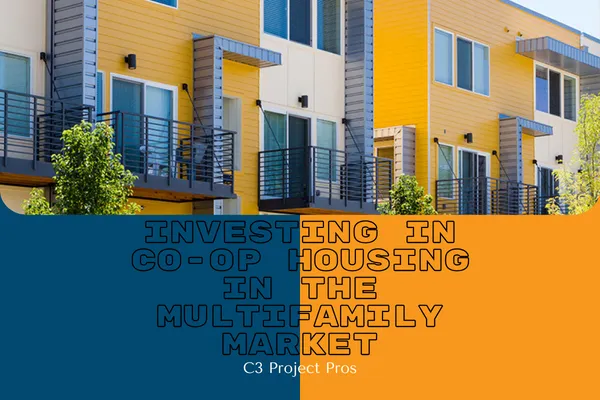
BLOG
STAY ON TOP OF CONTRACTOR TRENDS

INVESTING IN CO-OP HOUSING IN THE MULTIFAMILY MARKET
Stable housing brings several benefits to low-income families. First, stable housing provides a sense of security. This is from alleviating the stress associated with frequent moves or the uncertainty of rental arrangements. With a fixed and potentially more affordable housing cost, low-income families can rely on a consistent budget, allowing for better financial planning. Homeownership also opens the door to building equity over time, creating a pathway to long-term and generational wealth accumulation. Stable housing further enhances community ties, as families become invested in their neighborhoods. Stable housing often translates into better educational outcomes for children as a safe and stable home environment enhances academic performance. At the end of the day, the benefits of stable housing reach goes way beyond shelter. Equity housing empowers low-income families to break the cycle of poverty by providing housing stability, educational stability and generational wealth creating the groundwork for a more prosperous future.
Embarking on the journey of homeownership is a significant milestone, and as the real estate landscape evolves, so do the choices available to aspiring homeowners. One alternative gaining traction is cooperative housing, often referred to as co-op living. Beyond the traditional model of buying a single family home, co-op housing introduces a collaborative and community-oriented approach to housing. In this blog, we will dive into the world of co-op housing and explore the unique benefits it offers to new homeowners. We will also dive into the benefits, both financial and social from an investors perspective. From shared responsibilities to a sense of belonging, co-op living opens doors to a housing experience that transcends the conventional, providing a pathway to affordable homeownership with a strong emphasis on community and shared decision-making.
Investing in co-op housing can offer unique advantages for investors seeking both financial returns and a socially responsible investment. For investors, co-op housing presents an opportunity to participate in a socially conscious investment model that aligns with principles of shared responsibility and sustainable living. Beyond potential financial gains, investing in co-op housing allows individuals to contribute to the creation of affordable and inclusive communities while diversifying their investment portfolio. In this housing model investors can find not only potential returns on their investment but also the satisfaction of supporting principles and the well-being of the residents who actively participate in the governance of their shared living space. Investing in a housing co-op is different from traditional real estate investments because investors don't typically own individual units; instead, they become shareholders in the cooperative. The returns and financial benefits for investors in housing co-op’s may vary based on the financial structure, location, and other factors. Here are some considerations:
Dividends or Profit-Sharing:
Investors in a housing co-op may receive returns in the form of dividends or profit-sharing. These returns are typically a share of any surplus funds generated by the co-op after covering operating expenses, mortgage payments, and other costs.
Appreciation of Shares:
If the housing co-op's property appreciates in value, the value of the shares owned by investors may also increase. However, unlike traditional real estate, this appreciation is shared among all shareholders, and individual investors don't directly profit from the sale of specific units.
Stability and Predictability:
Housing co-op’d often provide stability in terms of predictable monthly fees and shared costs. This can be attractive to investors looking for a steady income stream, but the returns may not be as high as those associated with riskier or more speculative investments.
Community Investment:
Some investors are drawn to housing co-op’s as a form of community investment. The returns may not solely be financial but may also include the satisfaction of contributing to the development and sustainability of a community.
Tax Benefits:
Depending on the jurisdiction, there may be certain tax benefits associated with investing in housing co-op’s. For example, some areas offer tax incentives to co-op investors.
Risks and Challenges:
Investors should be aware of the risks and challenges associated with housing co-op’s. These may include potential conflicts among members, changes in the local real estate market, and the need for ongoing maintenance and improvements.
Limited Liquidity:
Shares in housing co-op’s may have limited liquidity. Selling shares might be subject to the approval of the co-op's board or other conditions, making it less flexible compared to traditional real estate transactions.
Legal and Regulatory Considerations:
The legal and regulatory environment for housing co-op’s can vary, impacting the rights and responsibilities of investors. It's crucial for investors to understand the legal framework governing co-op’s in a specific jurisdiction.
Before investing in a housing co-op, individuals should carefully review the co-op's financial statements, bylaws, and any other relevant documents. Consulting with financial advisors or experts in co-op housing can also provide valuable insights into the potential returns and risks associated with such investments.
While housing co-op’s offer various advantages, they also come with certain disadvantages. These drawbacks may influence individuals' decisions to choose a co-op housing arrangement. Here are some common disadvantages associated with co-ops:
Limited Control:
Co-op members have a say in decision-making, but ultimate control often lies with the co-op's board of directors. Some individuals may find this lack of control over certain aspects of property management less appealing than owning a traditional home.
Resale Challenges:
Selling shares in a housing co-op may be more complex than selling a traditional property. The approval of the co-op's board or other members may be required for a new member to join, potentially affecting the liquidity of the investment.
Restrictions on Use:
Co-ops often have rules and restrictions on how members can use their units. This might include restrictions on renovations, subletting, or other activities that homeowners in non-cooperative settings might have more flexibility with.
Potential for Assessments:
Members may be subject to special assessments for major repairs or improvements to the property. While this is also a concern for homeowners, co-op members may have less control over the timing and amount of these assessments.
Limited Appreciation Potential:
While the value of shares in a co-op can appreciate, it might not appreciate at the same rate as individual homes in the surrounding real estate market. This limitation on potential appreciation could be a disadvantage for those seeking significant returns on investment.
Membership Approval Process:
Joining a housing co-op involves an approval process by existing members or the board. This process can be rigorous, and individuals may be denied membership based on various factors, including financial stability and compatibility with the community.
Monthly Fees and Affordability:
While monthly fees in co-ops cover various expenses, they can also be relatively high. This may impact the affordability of cooperative living for some individuals, particularly if they are comparing it to traditional homeownership or renting.
Dependence on Other Members:
The co-op's financial health and overall living experience depend on the cooperation and responsible actions of all members. Disputes or financial issues among members can affect the well-being of the entire community.
Geographic Limitations:
Housing co-op’s may be more common in certain regions or urban areas, limiting the options for individuals seeking co-op living in specific locations.
Market Risks:
The co-op's financial stability may be influenced by external market factors. Economic downturns or changes in the local real estate market can affect the value of shares and the overall financial health of the co-op.
Despite these disadvantages, many individuals choose housing co-op’s because of the sense of community, shared responsibility, and potential affordability they offer. It's essential for prospective co-op members to carefully consider their personal preferences and financial goals before deciding to join a co-op.
In conclusion, investing in a co-op housing project extends far beyond financial considerations, carrying significant social impact and benefits. By actively participating in a co-op housing initiative, investors contribute to the creation of inclusive and sustainable communities where shared governance fosters a sense of belonging. The co-op model inherently promotes social cohesion, encouraging residents to collaborate, make collective decisions, and collectively shoulder responsibilities. This unique approach not only strengthens community bonds but also addresses the growing need for affordable and equitable housing solutions. As investors embrace co-op housing, they become instrumental in shaping the landscape of housing with a focus on shared values, communal well-being, and a commitment to responsible and socially conscious living. Ultimately, the social impact of investing in a co-op housing project resonates in the positive transformation of communities, reflecting a commitment to a more cooperative and interconnected vision of housing for the future.
